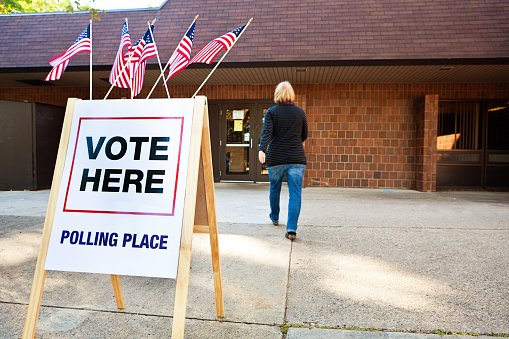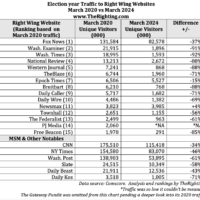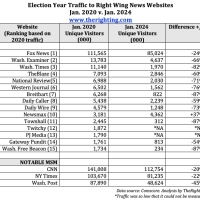
Rasmussen Reports Is Here to Stay, Facts Be Damned
By Michael Lovito, January 3, 2023
Did you know that 40 percent of Democrats think Joe Biden should be impeached for his handling of the Afghanistan withdrawal? Or that one third of Black voters supported Donald Trump in 2020? How about Barack Obama having only a 37 percent approval rating in February 2009, mere months after winning a decisive Electoral College victory?
Probably not, because according to most pollsters, these statistics do not conform with reality. But don’t tell that to the folks at Rasmussen Reports, an Asbury Park, New Jersey-based polling firm that’s been taking the temperature of American public opinion since 2003. Founded by ESPN co-founder Scott Rasmussen, Rasmussen Reports has made a name for itself by publishing data that delights conservatives but leaves most polling pros scratching their heads.
Experts on the left, right, and center have long taken issue with Rasmussen Reports’ research methods and telegraphed political preferences, but there’s no denying that its results have generated headlines and boosted Republican morale. It doesn’t matter if the mainstream media isn’t buying what Rasmussen is selling – its target audience is, and that’s enough to keep the pollster relevant in our hyper-polarized media environment.
GOP Morale Booster
After pursuing a number of different business ventures after selling ESPN to Texaco in 1983, Scott Rasmussen jumped into the polling game. In 1995 he founded GrassRoots Research (later renamed Rasmussen Research), whose results became popular with conservative media figures like Rush Limbaugh and Bill O’Reilly. Rasmussen sold Rasmussen Research in 1999 and became a commentator himself, writing for WorldNetDaily (now WND) and publishing a book that called for the privatization of Social Security. But the appeal of polling proved to be too much for him to resist, and he founded Rasmussen Reports in 2003.
Like its predecessor, Rasmussen Reports was a hit with the right. A feature on its website that allowed users to create their own polls was used by George W. Bush’s 2004 re-election campaign. In 2010, Republican Senate candidates like Carly Fiorina in California and Linda McMahon in Connecticut began citing Rasmussen polls to argue that they were actually competitive in their respective races.
Raised Eyebrows
But this popularity also bred scrutiny. After overestimating Republican victories in 2010 by an average of nearly four points, Rasmussen Reports was labeled as “quite biased” by data journalist and FiveThirtyEight founder Nate Silver, who questioned the reliability of its polls. Two years later, Rasmussen raised even more eyebrows when its final tracking poll of the 2012 presidential campaign showed Mitt Romney winning the popular vote over Obama, 49 percent to 48 percent. (Obama would go on to win just over 51 percent of the vote, while Romney settled for just over 47 percent.)
Finding Favor with 45
Scott Rasmussen left Rasmussen Reports in 2013 due to “disagreements over company business strategy,” but the firm achieved a new level of relevance when it became the favorite pollster of a certain 45th president. Like many right-leaning pollsters, Rasmussen Reports took a bit of a victory lap after 2016, claiming that its polls that showed Hillary Clinton in a tight race with Donald Trump vindicated their methodology and proved that there was a Democratic bias in mainstream polls. Throughout his presidency, Trump would tout results from Rasmussen Reports’ presidential approval surveys that showed him outperforming Obama’s approval numbers from the same point in his presidency, even though the vast majority of mainstream polls showed the opposite trend.
Unfortunately for Rasmussen Reports, their rosy outlook on Trump’s popularity did not match up with election results. In 2018, they predicted Republicans would win the generic ballot by one percentage point. Instead, Democrats won it by eight. In 2020, their final presidential poll showed Biden ahead by only one point, which they described as “a near tie.” Come election day, Biden would win the popular vote by four and a half points.
Pushing Election Fraud Conspiracies
Rasmussen Reports is far from the only pollster with an obvious political alignment. The Trafalgar Group also received heaps of conservative media coverage after they called a Trump victory in 2016 (like Rasmussen Reports, their track record since has been far from sparkling) and Data for Progress publishes polls with the express purpose of demonstrating the popularity of policies like the Green New Deal and Medicare for All.
But those firms always fall back on their data (no matter how accurate it may be) to justify their commentary. Rasmussen Reports, on the other hand, stands out for all of the non-polling discourse it publishes. Its website includes a “commentary” page that runs syndicated columns from the Creators Syndicate, whose stable of writers includes conservatives like Michael Barone, Stephen Moore, and Pat Buchanan. The Rasmussen Twitter account has also openly pushed election fraud conspiracies. In December 2020, the account called on Mike Pence to refuse to certify the presidential election results. Since the 2022 midterms, it has tweeted in support of Kari Lake’s claims that she lost the Arizona gubernatorial race due to fraud.
Rasmussen’s polls are sometimes sponsored by unusually partisan sources. Their last two presidential approval surveys were sponsored by two different books: Miranda Devine’s “Laptop from Hell,” about the alleged cover up surrounding the release of information from Hunter Biden’s laptop, and Matt Palumbo’s “The Man Behind the Curtain,” about George Soros’ political efforts. Rasmussen Reports COO Mark Mitchell and Post Hill Press (the publisher of both books) ignored our requests for comment about the sponsorships. Miranda Devine, who said she was “baffled” by our interest in this story, indicated that she would make herself available for comment, but ignored subsequent messages.
Here to Stay
One of the ironies of Rasmussen’s conservative clout chasing is that certain aspects of its methodology, which have long been the target of criticism, have become acceptable. Back in 2010, Nate Silver complained that Rasmussen Reports’ preference for interviewing likely voters instead of registered voters limited the firm’s sample size to “political junkies”; now, polls of likely voters are preferred across the board. And while Rasmussen Reports’ interactive voice response polls, in which a pre-recorded voice instead of a live interviewer polls subjects, has not been embraced throughout the industry, their surveys still received a “B” rating from FiveThirtyEight for the 2020 election cycle.
Despite Rasmussen Reports’ reputation as a polling pariah, there are some in the industry who welcome a contrarian. “I’ve never sensed that mainstream pollsters are a particularly political bunch,” Karlyn Bowman, a distinguished senior fellow emeritus at the American Enterprise Institute who studies public opinion, told TheRighting in an email. “But they are ideological in the sense that their worldview tends to be shaped by the stories that that appear in the New York Times or Washington Post. They often tend to poll based on news stories from those outlets. It is good to have other perspectives.”
And while Rasmussen Reports’ predictions may not always hold up, the market forces that make them a viable business aren’t going anywhere. “I’m sure their reputation has taken a hit [after the midterms], but that niche will not stop existing,” said Clare Considine, a survey methodologist and contributor to election modeling website Split Ticket. “As long as we have the media ecosystem and the consumer polarization that we do, that niche isn’t going away. Even if it fosters bullshit.”
Michael Lovito is a Brooklyn-based reporter and critic whose work has appeared in Salon, Brooklyn Magazine, Pavement Pieces, and The District. He also serves as editor-in-chief of the politics and pop culture website The Postrider. @MLovito
Interested in more news about right-wing media curated especially for mainstream audiences? Subscribe to our free daily newsletter.
Rasmussen Reports has made a name for itself by publishing data that delights conservatives but leaves most polling pros scratching their heads. (Image: Pixabay)
























